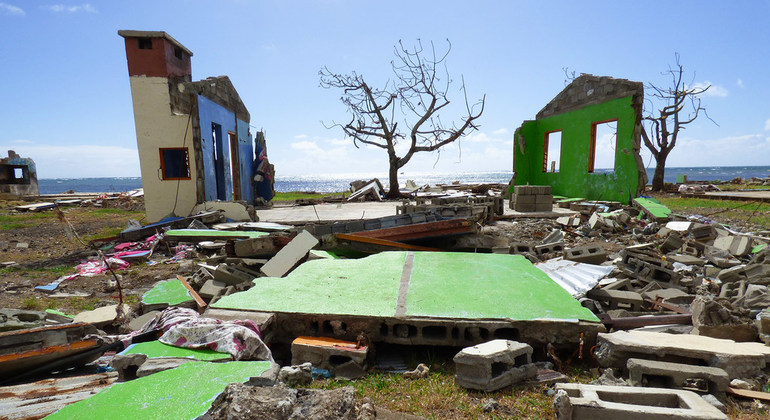In an urgent call for countries to prepare better for all catastrophic events – from earthquakes and tsunamis to biological threats such as the new coronavirus – data from the UN Office on Disaster Risk Reduction (UNDRR) indicates that wealthy nations have done little to tackle the harmful emissions that are linked to climate threats which make up the bulk of disasters today.
Short odds
“Disaster management agencies have succeeded in saving many lives through improved preparedness and the dedication of staff and volunteers. But the odds continue to be stacked against them, in particular by industrial nations that are failing miserably on reducing greenhouse gas emissions,” said Mami Mizutori, UNDRR chief, and Special Representative of the Secretary-General for Disaster Risk Reduction.
According to the UNDRR report – produced with Belgium’s Centre for Research on the Epidemiology of Disasters at UCLouvain – there were 7,348 recorded disaster events worldwide, during the last two decades.
Approximately 1.23 million people died – approximately 60,000 per year – with more than four billion affected in total; many more than once.
These two decades of disaster also caused $2.97 trillion in losses to the global economy, with data also indicating that poorer nations experienced deaths rates more than four times higher than richer nations.
By comparison, the previous 20-year period (1980 to 1999) saw 4,212 reported disasters from natural hazards, with 1.19 million deaths, more than three billion people affected and economic losses totalling $ 1.63 trillion.
Climate danger spike
Although better recording and reporting of disasters may help explain some of the increase in the last two decades, researchers insisted that the significant rise in climate-related emergencies was the main reason for the spike, with floods accounting for more than 40 per cent of disasters – affecting 1.65 billion people – storms 28 per cent, earthquakes (eight per cent) and extreme temperatures (six per cent).
“This is clear evidence that in a world where the global average temperature in 2019 was 1.1 degrees Celsius above the pre-industrial period, the impacts are being felt in the increased frequency of extreme weather events including heatwaves, droughts, flooding, winter storms, hurricanes and wildfires,” UNDRR reported .
Despite the pledge made by the international community in Paris in 2015 to reduce global temperature rise to 1.5 degrees Celsius above pre-industrial levels, Ms. Mizutori added that it was “baffling” that nations were continuing knowingly “to sow the seeds of our own destruction, despite the science and evidence that we are turning our only home into an uninhabitable hell for millions of people”.
COVID-19 exposure
Turning to the COVID-19 pandemic, which has “laid bare many shortcomings in disaster risk management (despite) repeated warnings”, the UNDRR report recommended urgent action from Governments to better manage such overlapping disasters.
These hazards included known “risk drivers”, such as poverty, climate change, air pollution, population growth in dangerous locations, uncontrolled urbanization and the loss of biodiversity.
Chronic needs
By way of an example of chronic weather risks which should be the focus of better national preparedness measures, the agency pointed that shifting rainfall patterns pose a risk to the 70 per cent of global agriculture that relies on rain and the 1.3 billion people dependent on degrading agricultural land.
Despite the fact that extreme weather events have become so regular in last 20 years, only 93 countries have implemented disaster risk strategies at a national level ahead of the end-of-year deadline, Ms. Mizutori said.
“Disaster risk governance depends on political leadership above all, and delivery on the promises made when the Paris agreement and the Sendai Framework for Disaster Risk Reduction were adopted,” she said. “But the sad fact is that we are wilfully destructive. And that is the conclusion of this report; COVID-19 is but the latest proof that politicians and business leaders have yet to tune into the world around them.”
She added: “It really is all about governance if we want to deliver this planet from the scourge of poverty, further loss of species and biodiversity, the explosion of urban risk and the worst consequences of global warming”, in a joint statement with UCLouvain’s Professor Debarati Guha-Sapir.
Although the UNDRR report indicates that there has been some success in protecting vulnerable communities from isolated hazards, thanks to more effective early warning systems, disaster preparedness and response, projected global temperature rises could make these improvements “obsolete in many countries”, the agency warned.
Currently, the world is on course for a temperature increase of 3.2 degrees Celsius or more, unless industrialised nations can deliver reductions in greenhouse gas emissions of at least 7.2 per cent annually over the next 10 years in order to achieve the 1.5 degree target agreed in Paris.



